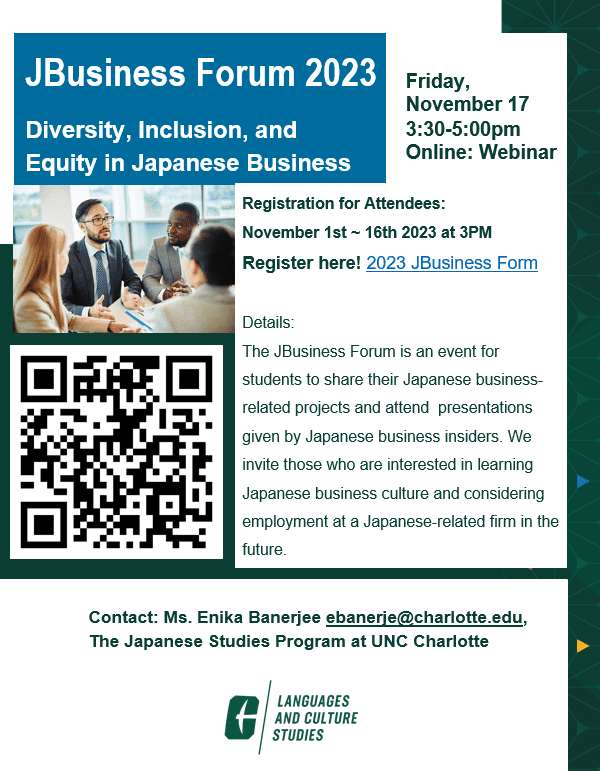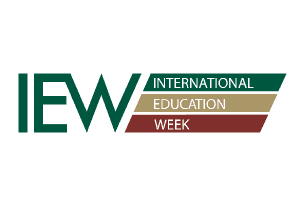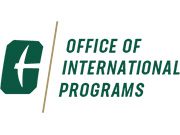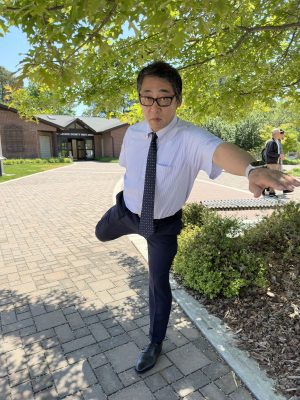JBusiness Forum 2023
JBusiness Forum
An excellent opportunity for students to share their projects with peers in a non-competitive environment!

Event Description
The JBusiness Forum is an event for students to share their Japanese business-related projects and presentation given by Japanese business insiders. We invite those who are interested in learning Japanese business culture and considering employment at a Japanese-related firm in the future.
In addition to two guest speakers, four student projects will be selected for the event, and they will present their undergraduate research at the JBusiness Forum.
Time & Date: Friday at 3:30-5:00 PM EST. November 17th, 2023
Location: Webinar. (The link will be provided later).

Application for Student Presenters
Closed.
Registration for Attendees
Attendee registration opens on November 1st and ends on November 16th, 2023. The Zoom link for the event will be sent at a later date to your email address. Please visit the following link to register for this event.
Event Schedule
| Time | Speakers and presenters |
|---|---|
| 3:30pm | Greetings Enika Banerjee Opening Session Department Chair: Dr. Anabel Aliaga-Buchenau Guest speaker: Dr. Atsushi Sumi |
| 4:00pm | 1. Nydacia Gray & Alexis Abella UNC Charlotte “Diversity In Japanese Companies: Driving Globalization Within the Video Game Industry” 2. Evvan Land University of Colorado, Boulder “Cross-Cultural Communication Challenges: A Survey of American Workers in Japan” 3. Megan Martin Kennesaw State University “Internship at Morito Scovill” 4. Garrett McCall Baylor University “USEN-NEXT & U-NEXT: Diversity in Japan’s Streaming Services” |
| 4:30pm | Guest speaker: Luke Hutton Q&A |
| 5:00pm | Closing Yukiko Yokono Farewell & Survey Enika Banerjee |
EVENT SPONSORS
Japan Foundation Los Angeles
Office of International Programs at UNC Charlotte
*JBusiness Forum 2023 is part of the International Education Week this year.



Event Organization
Organizer: The Japanese Studies Program at UNC Charlotte
Featured Guest Speakers

Luke Hutton- alumni
Luke is currently a Japanese-to-English freelance translator working primarily for Yen Press, Kodansha USA, and a Japanese agency that handles PR and marketing-related translations for Fortune 500 companies. He graduated from UNC-Chapel Hill in 2016 with a bachelor’s in journalism and a minor in English, and UNC Charlotte in 2019 with a bachelor’s in Japanese. While attending UNC Charlotte, he helped as a Teacher’s Assistant for one semester and served as the secretary in the Nihon Club. He also studied abroad at Doshisha University in Kyoto for two semesters. His experience at UNC Charlotte helped him hone his language and translation skills and gain familiarity with Japanese business etiquette. Luke is happy to share his experience finding work as a translator and working with Japanese on a daily basis.

Dr. Atsushi Sumi (Visiting Professor from Meiji University, Tokyo, Japan)
Atsushi Sumi is an Associate Professor of International Management in the School of Business Administration at Meiji University in Tokyo, Japan. He holds a Ph.D. and an M.A. in Cultural Anthropology from the University of New Mexico, as well as a B.A. in Economics from Keio University. Currently on a research sabbatical from Meiji University, he is affiliated with the Belk College of Business at UNC Charlotte. Atsushi’s research mainly concerns the globalization and localization of Japanese manufacturing companies as they expand into overseas markets. By combining management studies with an anthropological approach, he is interested in studying, learning, and teaching about the corporate cultures of Japanese companies in Japan and their subsidiaries worldwide.
Questions and Contact
For questions or information, please contact: Ms. Enika Banerjee ebanerje@uncc.edu, The Japanese Studies Program at UNC Charlotte.
Contact: Ms. Enika Banerjee ebanerje@charlotte.edu
We will be updating this webpage. Please check back frequently!
Abstracts
Nydacia Gray & Alexis Abella
UNC Charlotte
Diversity In Japanese Companies: Driving Globalization Within The Video Game Industry
This presentation will discuss the diversity in Japanese companies and how it drives globalization within the video game industry, specifically the Mario and Pokemon franchises. The aim will be to showcase how Nintendo has used diversity to drive sales and build a global audience. This diversity has been reflected with the use and creation of specific characters, elements, and cultures from various backgrounds and ethnicities. We will highlight a few human Pokemon characters along with the diversity brought in the creation of Mario games and products. These elements have been successful due to peaking public curiosity and has led to globalization of their products, such as their games and television shows. We will complete the presentation by discussing the limitations and areas for improvement.
Evvan Land
University of Colorado, Boulder
Cross-Cultural Communication Challenges: A Survey of American Workers in Japan
Differences of communication styles often become the center of issues in intercultural business settings. The gap in research on communication between Americans and Japanese has persisted for many years and Americans striving to work in Japan lack research backed resources on navigating the social intricacies of Japanese workplace norms. In “Different Games, Different Rules” (1996), Yamada claims the goal in American style communication is explicit individualized expression of meaning while the goal of Japanese style communication is implicit communication between interdependent group members. Yamada asserts misalignment in delivery and interpretation through these implicit and explicit communication styles marks the crucial difference. This survey study intends to examine the communication styles of Americans in a Japanese business setting to shed light on how American businesspersons adapt or struggle to adapt to a Japanese communication style. I sent the survey to American businesspersons who worked or are currently working with Japanese businesspersons in Japan and obtained sixteen responses. The Spearman Rank Correlation Test was employed to quantitatively analyze responses to all questions, aiming to determine the presence of a strong correlation between communication styles and communication difficulties. The results demonstrate a statistically significant correlation between a respondent indicating a high level of difficulty and adopting an American communication style. Based on these results, I would like to argue that this survey brings to foreground potential weaknesses regarding communication during work meetings and could be a valuable starting point for future research in this area.
Megan Martin
Kennesaw State University
Internship at Morito Scovill
For more than a century, Morito Japan Co. has been providing the world with a diverse array of premium products, such as fasteners and attaching machines. As a part of their strategic expansion efforts, Morito Japan Co. acquired Scovill Fasteners in 2014, which had been providing the United States with fastener products for over two centuries. Through the Asian Studies program at KSU, I was granted the opportunity to join the Morito Scovill Americas team as a finance intern. This experience not only allowed me to witness the world of Japanese business culture, but also provided me with an environment to interact and engage with this culture firsthand. From receiving omiyage, to practicing my keigo, to discovering Japanese business laws, this internship experience was a priceless introduction to a future career I wish to pursue. The company’s global presence exposed me to not just the practices of Japanese business culture, but the business practices from various Asian, Central and South American, and European nations as well. The interaction between Japanese and global business culture was an interesting display of cross-cultural dynamics. My internship experience was not only an observation of Japanese business culture; it was a period of professional growth and the creation of valuable connections within the world of Japanese business. This experience was quite impactful and solidified my desire to pursue a career in Japanese business. I am so grateful for the opportunities this internship has granted me and the positive effect it had on my future aspirations.
Garrett McCall
Baylor University
USEN-NEXT & U-NEXT: Diversity in Japan’s Streaming Services
U-NEXT is the number 1 Japan-based streaming service, under USEN-NEXT HOLDINGS. In this presentation, USEN-NEXT and U-NEXT are examined for their mission statements regarding DEI initiatives alongside their actual performance in achieving them. Additionally, Netflix is used as an example of what U-NEXT should strive for in producing and offering more diverse content for and by Japanese people. The result of the research is that USEN-NEXT is a very DEI-forward organization, with 80% of employees taking classes on LGBTQ issues, opening doors for employment of disabled persons, and offering great work-life balance for all employees. They also report that 30% of their managers are women, which is above the national average and meeting national DEI goals. U-NEXT, the streaming service owned and operated by USEN-NEXT, is a multi-faceted entertainment service with the goal of offering every kind of content for everyone. Towards this goal, U-NEXT has collections featuring movies that follow the lives and struggles of LGBT characters. While this is good, U-NEXT should look to Netflix as an example of what a streaming service is able to do both showcase and fund the creation of projects showcasing the stories of underrepresented people. Netflix has $100 million set aside for the funding of projects by diverse creators, which allows them to more easily showcase the creative talents and struggles of people who may not have the chance to through other channels. U-NEXT should continue to expand their portfolio and aim to create spaces for diverse people to tell their stories.